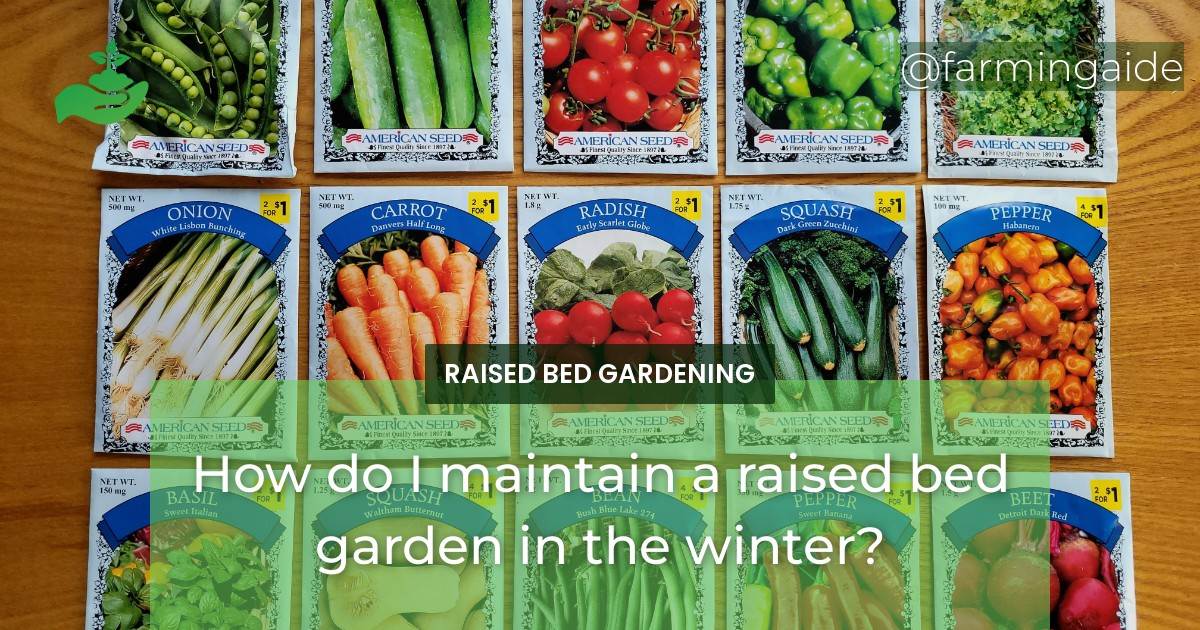Winter maintenance for raised beds is essential to keep your garden healthy and thriving year-round. Although the cold season can be harsh on your plants, it is possible to protect them and ensure they have everything they need to survive and grow. Here are some tips for protecting your raised bed garden in winter and caring for it during the colder months.
Preparing Raised Beds for Winter
Clean Up the Beds
The first step in preparing your raised beds for winter is to clean them up. Remove any spent plants, weeds, and debris from the bed, as they can harbor pests and diseases that may infect your new plants in the spring. You can either compost the debris or dispose of it in the trash. Once the bed is clean, till the soil to aerate it and remove any remaining debris.
Add Nutrients
After cleaning the bed, add a layer of compost or other organic matter to the soil. This will add nutrients and improve the soil structure, making it easier for plants to grow. You can also add lime or other soil amendments if your soil needs it.
Cover Crops
Another option for preparing your raised beds for winter is to plant cover crops. Cover crops are plants that are grown specifically to protect and enrich the soil. They can help prevent soil erosion, reduce weeds, and add valuable nutrients to the soil. Common cover crops for winter include rye, clover, and vetch.
Winter Protection for Raised Beds
Mulching
Mulching is an effective way to protect your plants from the cold and maintain soil moisture. Apply a layer of mulch, such as straw or leaves, around the base of your plants. This will insulate the soil and keep it warm, which will help the plants grow and thrive.
Covering Beds with Plastic
If you live in an area with harsh winters, covering your raised beds with plastic can help protect your plants from the cold wind and snow. Use stakes to hold the plastic in place, making sure to leave some space for air to circulate and prevent condensation from building up.
Using Cold Frames
Cold frames are another great option for protecting your raised bed garden in the winter. They are basically mini greenhouses that trap heat and protect your plants from the cold. You can build your own cold frame using recycled materials or purchase one from a garden center.
ALSO READ
Watering During Winter
Reducing Watering Frequency
In the winter, plants require less water than they do during the growing season. Reduce your watering frequency accordingly, making sure not to overwater your plants. Overwatering can lead to root rot and other issues.
Watering During Thaws
If the ground thaws during a warm spell, take advantage of it and give your plants a good drink. This will help keep them hydrated and healthy until the next freeze.
Protecting Water Sources
Make sure any water sources you use in your raised bed garden are protected from freezing. Drain hoses and store them indoors, and consider using a heated birdbath or other device to prevent your water source from freezing.
Pests and Diseases in Winter
Removing Debris
As mentioned earlier, removing debris from your raised beds is essential to prevent pests and diseases from taking hold. Make sure to dispose of any debris properly to avoid spreading disease.
Using Beneficial Insects
Consider introducing beneficial insects to your raised bed garden to help control pests naturally. Ladybugs, lacewings, and parasitic wasps are all effective at controlling common pests like aphids and spider mites.
Keeping an Eye on Plants
Check your plants regularly for signs of pests or disease. Catching issues early can help prevent them from spreading and causing more damage.
ALSO READ
Harvesting in Winter
Timing Your Harvest
Some plants can be harvested in the winter, while others need to wait until spring. Timing is everything when it comes to winter harvesting. Research when your plants are ready to be harvested and plan accordingly.
Protecting Plants
Use covers like row covers or cloths to protect your plants from frost and snow. These covers can help keep them warm and prevent damage from the cold weather.
Using Season Extenders
Season extenders like cold frames or hoop houses can also help you harvest crops in the winter. These structures trap heat and protect your plants from the cold, allowing them to grow and produce even in the off-season.
-Can the Design of a Raised Bed Garden Impact Maintenance During Winter?
The design of a raised bed garden can greatly impact maintenance during winter. With a well-thought-out design, incorporating features like proper drainage and proper soil insulation, winter maintenance becomes more manageable. A well-designed raised bed substring allows for easier access and protection against extreme weather conditions, reducing the maintenance efforts needed to keep the garden healthy during the colder months.
Conclusion
Winter maintenance for raised beds may seem daunting, but with the right care and protection, your garden can thrive year-round. By following these tips and taking the necessary precautions, you can ensure your plants stay healthy and strong, even in the coldest months.


